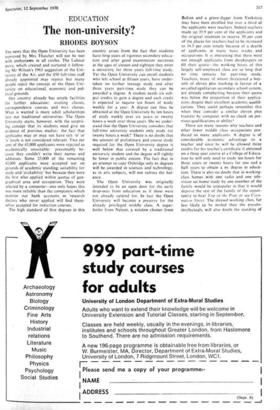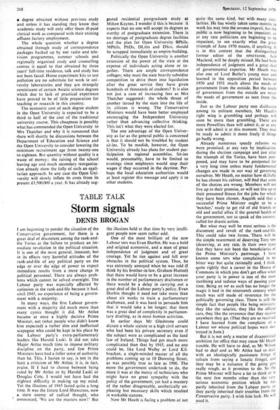EDUCATION
The non-university?
RHODES BOYSON
The news that the Open University has been reprieved by Mrs Thatcher will not be met with enthusiasm in all circles. The Labour party, which created and nurtured it follow- ing Mr Wilson's 1963 suggestion of the Uni- versity of the Air, and the 450 full-time staff already appointed may rejoice but many people reject the concept of the Open Uni- versity on educational, economic and pol- itical grounds.
Our country already has ample facilities for further education: evening classes, correspondence courses and WEA classes. What is wanted is more adult scholarships into our traditional universities. The Open University starts, however, with the surpris- ing concept that its students need give no evidence of previous studies: the fact that applicants may or may not have ccE 'o' or `A. levels is not considered relevant. Two per cent of the 43,000 applicants were rejected as academically unsuitable: presumably be- cause they couldn't write their names and addresses. Some 25,000 of the remaining 42.000 applicants were accepted not on grounds of academic standing, suitability for study and `stickability' but because they were the first who applied within quotas of geo- graphical area and occupation. They were selected by a computer—one only hopes this was more reliable than the computers which monitor our bank accounts or 'research doctors who never applied will find them- selves accepted for induction courses.
The high standard of first degrees in this
country arises from the fact that students have long years of rigorous secondary educa- tion and after good examination successes at the ages of sixteen and eighteen they enter a university for three years full-time study. Yet the Open University can enroll students who left school at fifteen years, have under- taken no further teenage study and after three years part-time study they can be awarded a degree. A student needs six sub- ject credits to gain a degree and each credit is expected to require ten hours of study weekly for a year. A degree can thus be obtained at the Open University by ten hours of study weekly over six years or twenty hours a week over three years. Do we under- stand that the Open University considers that full-time university students only study for twenty hours a week? There is no doubt that the amount of preliminary and course study required for the Open University degree is well below that covered by a traditional university student and the degree will rightly be lower in public esteem. The fact that in an attempt to copy Oxbridge only BA degrees will be awarded in sciences and technology, as in arts subjects, will not redress the bal- ance.
The Open University was originally intended to be an open door for the early drop-outs from education as if these were not already catered for. In fact the Open University will become a preserve for the already privileged middle class. A sugar- boiler from Nelson, a window cleaner from
Bolton and a grave-digger from Yorkshire may have been enrolled but over a third of the applicants were teachers. Indeed teachers made up 35.9 per cent of the applicants and the original intention to reserve 30 per cent of the places for teachers had to be increased to 34.3 per cent simply because of a dearth of applicants in many basic trades and occupations. It is interesting that there were not enough applicants from shopkeepers to fill their quota—the working hours of this largely self-employed class are so long that no time remains for part-time study. Teachers, many of whom threatened a boy- cott of eleven plus marking in favour of a so-called egalitarian secondary school system, are already complaining because their quota was below the proportion of their applica- tions despite their excellent academic qualifi- cations. They could perhaps remember this when they consider a similar eleven plus transfer by computer with no check on pre- vious qualifications or ability!
There are many reasons why teachers and other lower middle class occupations pro- duced so many applicants. A degree is of considerable economic advantage to a teacher and since he will be allowed three credits for his teacher's certificate if obtained on a three year course at a College of Educa- tion he will only need to study ten hours for three years or twenty hours for one and a half years to obtain a BA degree in educa- tion. There is also no doubt that in working- class homes with one radio and one tele- vision set home study by one member of the family would be unpopular in that it would deprive the rest of the family of the oppor- tunity to hear Top of the Pops or see Coro- nation Street. The shrewd working class, far less likely to be misled than the pseudo- intellectuals, will also doubt the standing of
a degree obtained without previous study and unless it has standing they know that academic study will only offer them ill-paid clerical work as compared with their existing affluent factory employment.
The whole question whether a degree obtained through study of correspondence packages backed up by sec radio and tele- vision programmes, summer schools and regionally organised study and counselling centres is equal to that obtained by three years' full-time residence, talk and study has not been faced. Home experiment kits to test pollution are no substitute for work in uni- versity laboratories and they are strangely reminiscent of certain Asiatic science degrees which due to lack . of practical experience have proved to be of little preparation for teaching or research in this country.
The economic cost of each degree student in the Open University is expected to be a third to half of the cost of the traditional university course. This cheapness is possibly what has commended the Open University to Mrs Thatcher and why it is rumoured that there will shortly be discussions between the Department of Education and Science and the Open University to consider lowering the minimum recruitment age from twenty-one to eighteen. But quantity without quality is a waste of money: the raising of the school leaving age and much secondary reorganisa- tion already show the folly of such an egali- tarian approach. In any case the Open Uni- versity will slowly inflate its costs from its present £3,500,000 a year. It has already sug-, nested residential postgraduate study at Milton Keynes. I wonder if this is because it expects that no one will accept its degrees as worthy of postgraduate extension. There is no shortage of postgraduate degree facilities and the plan for Open University BPhils, MPhils, PhDs, DLitts and DScs, should be scrapped immediately as empire-building.
Politically the Open University is another extension of the power of the state at the expense of individuals acting alone or to- gether. There are ample correspondence colleges; why must the state heavily subsidise competition to drive them into liquidation after the great service they have given hundreds of thousands of students? It is also not just a case of increasing fees as Mrs Thatcher suggested: the whole threat of another inroad by the state into the life of its citizens is wrong. The Conservative Ministers would have been better employed encouraging the Independent University rather than advancing collective thinking. This isn't what they were elected for.
The one advantage of the Open Univer- sity as far as the general public is concerned is that it should not be troubled by student sit-ins. To be modish, however, the Open University already has plans for student par- ticipation in regional assemblies. Sit-ins would, presumably, have to be limited to evenings since employers would stop their wages if they occurred in the daytime. Per- haps the local education authorities would at least register this message and apply it to other students.















































 Previous page
Previous page